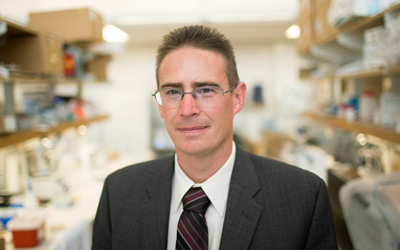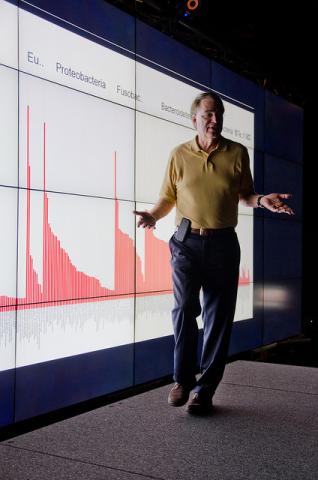
Two computer scientists at UC San Diego are raising the profile of research on the human microbiome -- the 100 trillion human cells in and on each human body, of which only 10 trillion are human. The correct balance of microbes can keep pathogens in check and regulate the immune system, and microbes are essential in food digestion and synthesizing vitamins.
 Rob Knight (left), a CSE faculty-affiliate and professor of pediatrics in the School of Medicine, is making headlines again, reporting that microbial communities on adult skin are on average more similar to those of their own dogs than to other dogs. "With a fair amount of precision," Knight said, "we could pick your dog out of a crowd based solely on microbiomes." The study raises questions about how the family dog may affect an individual's health, given that a human and their dog share similar microbial populations. For instance, Knight says there is mounting evidence that living with a dog in infancy lowers a child's risk of developing asthma and allergies. The professor co-founded the American Gut Project, a crowdsourcing initiative to get people to contribute mouth, skin or gut samples of their own, their family members, and their dogs for microbiome sequencing. Participants get to find out what microbe populations they share with others, and researchers get a growing database on which to base future studies of the microbiome and the influence that having a dog and other factors may have on human health. Knight's lab is also sequencing microbiomes submitted to a University of Arizona study focused specifically on dogs and human health. "The idea of combining animal, human and environmental health, and seeing the whole picture through the lens of the microbes that we share, is an increasing direction for research," Knight told the San Diego Union-Tribune.
Rob Knight (left), a CSE faculty-affiliate and professor of pediatrics in the School of Medicine, is making headlines again, reporting that microbial communities on adult skin are on average more similar to those of their own dogs than to other dogs. "With a fair amount of precision," Knight said, "we could pick your dog out of a crowd based solely on microbiomes." The study raises questions about how the family dog may affect an individual's health, given that a human and their dog share similar microbial populations. For instance, Knight says there is mounting evidence that living with a dog in infancy lowers a child's risk of developing asthma and allergies. The professor co-founded the American Gut Project, a crowdsourcing initiative to get people to contribute mouth, skin or gut samples of their own, their family members, and their dogs for microbiome sequencing. Participants get to find out what microbe populations they share with others, and researchers get a growing database on which to base future studies of the microbiome and the influence that having a dog and other factors may have on human health. Knight's lab is also sequencing microbiomes submitted to a University of Arizona study focused specifically on dogs and human health. "The idea of combining animal, human and environmental health, and seeing the whole picture through the lens of the microbes that we share, is an increasing direction for research," Knight told the San Diego Union-Tribune.
 Meanwhile, another CSE professor is involved in an effort to make microbiome sequencing more accessible to researchers. The company uBiome makes a toolkit for researchers, and it just announced a global academic research consortium to study microbiomes and health. Part of the challenge involves computing and 'quantified health' technologies, so it was no surprise when the company announced this week that CSE Prof. Larry Smarr (right) had been appointed to the scientific advisory board of uBiome in connection with the launch of the global consortium "to bring together talented researchers worldwide... to complement, not replace or compete with, efforts like the IHMC and NIH Human Microbiome Project." Membership is open to researchers worldwide, with beneits that could include up to $100,000 worth of microbiome kits to support exceptional research proposals, especially in underrepresented areas. As uBiome noted in its press release announcing the consortium and Smarr's involvement, "the latest research suggests that the correct balance of microbes serves to keep potential pathogens in check and regulate the immune system." For its part, uBiome provides participants with a catalog of their sequenced microbiomes through a self-collected sample that is then processed in uBiome's San Francisco lab. Joining CSE's Smarr on the uBiome advisory board announced May 7 are UCSF professor and MacArthur Genius Award winner Joseph DeRisi, and Jonathan Eisen, a professor of microbiology at UC Davis.
Meanwhile, another CSE professor is involved in an effort to make microbiome sequencing more accessible to researchers. The company uBiome makes a toolkit for researchers, and it just announced a global academic research consortium to study microbiomes and health. Part of the challenge involves computing and 'quantified health' technologies, so it was no surprise when the company announced this week that CSE Prof. Larry Smarr (right) had been appointed to the scientific advisory board of uBiome in connection with the launch of the global consortium "to bring together talented researchers worldwide... to complement, not replace or compete with, efforts like the IHMC and NIH Human Microbiome Project." Membership is open to researchers worldwide, with beneits that could include up to $100,000 worth of microbiome kits to support exceptional research proposals, especially in underrepresented areas. As uBiome noted in its press release announcing the consortium and Smarr's involvement, "the latest research suggests that the correct balance of microbes serves to keep potential pathogens in check and regulate the immune system." For its part, uBiome provides participants with a catalog of their sequenced microbiomes through a self-collected sample that is then processed in uBiome's San Francisco lab. Joining CSE's Smarr on the uBiome advisory board announced May 7 are UCSF professor and MacArthur Genius Award winner Joseph DeRisi, and Jonathan Eisen, a professor of microbiology at UC Davis.

